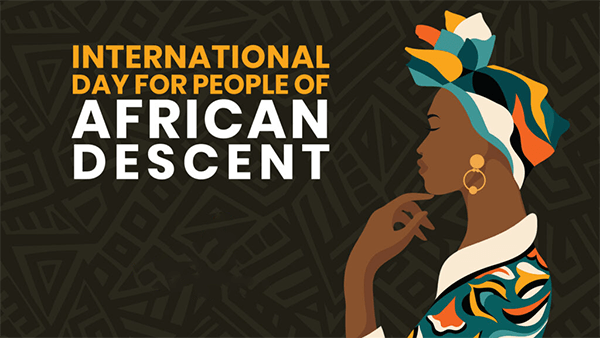As the sun rises on August 31st, it illuminates a day of profound significance—International Day for People of African Descent. This day is more than a mark on the calendar; it is a celebration of resilience, culture, and the indomitable spirit of Africa’s descendants scattered across the globe. The echoes of drums, the rhythm of ancestral songs, and the vibrant colors of kente cloth tell stories that transcend time, reminding us of the rich heritage that flows through the veins of millions.

Africa, the cradle of civilization, has given birth to countless cultures, languages, and traditions that have shaped the world. From the ancient pyramids of Egypt to the intricate beadwork of the Maasai, the continent’s history is a tapestry woven with threads of triumph, struggle, and beauty. This day honors not just the past but the present and future of African descendants who continue to enrich the world with their creativity, wisdom, and unwavering spirit.
But what does it mean to be of African descent in today’s world? It means carrying forward a legacy of kings and queens, of warriors and scholars, of artists and innovators. It means standing tall in the face of adversity, just as our ancestors did, and it means embracing our identity with pride and dignity.
The story of the African diaspora is one of movement—sometimes forced, sometimes chosen—but always transformative. The transatlantic slave trade ripped millions from their homelands, scattering them like seeds across foreign soils. Yet, from the pain and suffering, new cultures blossomed in the Americas, Europe, the Caribbean, and beyond. The beats of jazz, the soul of gospel, the flair of samba—all these are echoes of Africa’s heart.
Why this day Matters
For many of us, university is where we begin to question who we are and where we come from. It’s a time of self-discovery and exploration, and for students of African descent, it’s also a time to reconnect with a heritage that spans millennia and continents. This day is a recognition of that journey—a journey that began in the heart of Africa and has continued through centuries of migration, adaptation, and innovation.
Think about it: the music we listen to, the literature we study, the art we admire—all of these are infused with African influences. Whether it’s the rhythm of Afrobeat that pulses through your headphones or the profound themes of identity and resistance in African literature, the legacy of Africa is alive and thriving in our everyday lives.
The history of people of African descent is one of profound complexity. It’s a story that begins with the great kingdoms of Africa—Ghana, Mali, Zimbabwe—and extends through the devastating impact of the transatlantic slave trade. Yet, despite the hardships, the descendants of Africa have not only survived but thrived, creating vibrant cultures in places as far-flung as Brazil, Jamaica, the United States, and right here in Africa.
So, as you navigate your university journey, take a moment to connect with your roots. Celebrate the richness of African culture, reflect on the struggles and triumphs of those who share your heritage, and commit to carrying that legacy forward. Because in understanding our past, we find the power to build a better future.
Cultural Week is espoused around bringing together culture exchange from every corner of Mount Kenya University from Kenya and international students.
Recommended Reads
To truly appreciate the depth of African heritage, one must dive into the words of those who have lived, breathed, and embodied the spirit of the continent. Here are some books that provide a window into the soul of Africa and its diaspora. They wiill not only enrich your knowledge but also broaden your perspective:
1. Things Fall Apart by Chinua Achebe
This classic novel offers a poignant look at the impact of colonialism on traditional African societies, highlighting the tensions between old and new worlds.
2. Homegoing by Yaa Gyasi
A sweeping saga that traces the lineage of two sisters—one sold into slavery, the other married to a British slaver—across three hundred years and multiple generations.
3. The Souls of Black Folk by W.E.B. Du Bois
A seminal work in African American literature, this collection of essays explores the lived experiences of African Americans in the post-Reconstruction era.
4. The Warmth of Other Suns by Isabel Wilkerson
This powerful narrative tells the story of the Great Migration, when millions of African Americans left the rural South for cities in the North and West, reshaping American culture.
5. Born a Crime by Trevor Noah
A memoir that blends humor and heartbreak as it chronicles the comedian’s upbringing in apartheid South Africa, offering insights into the complexities of race and identity.
6. Half of a Yellow Sun by Chimamanda Ngozi Adichie
Set during the Nigerian Civil War, this novel weaves together the lives of several characters, capturing the turbulence and tragedy of the time.
7. Africana The Encyclopedia of the African and African American Experience by Henry Louis Gates Jr. and Kwame Anthony Appiah
A comprehensive reference that delves into the history, culture, and achievements of people of African descent worldwide.
Written by: Heri Manyara
herimanyara95@gmail.com
